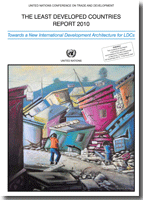The UN Conference on Trade and Development published "The Least Developed Countries Report 2010" which, among other issues, indicates that the LDC small island developing states (SIDS) and LDCs in Asia are particularly vulnerable to the impact of storms and are also the least able to cope with the social and economic fallout from climate-related incidents.
 25 November 2010: The UN Conference on Trade and Development (UNCTAD) published “The Least Developed Countries Report 2010” which, among other issues, highlights the vulnerability of LDCs to climate impacts. For example, the report indicates that the LDC small island developing states (SIDS) and LDCs in Asia are particularly vulnerable to the impact of storms and are also the least able to cope with the social and economic fallout from climate-related incidents.
25 November 2010: The UN Conference on Trade and Development (UNCTAD) published “The Least Developed Countries Report 2010” which, among other issues, highlights the vulnerability of LDCs to climate impacts. For example, the report indicates that the LDC small island developing states (SIDS) and LDCs in Asia are particularly vulnerable to the impact of storms and are also the least able to cope with the social and economic fallout from climate-related incidents.
Although the LDCs as a group contribute relatively little to global warming — accounting for less than 1 per cent of the world’s total greenhouse gas (GHG) emissions — the report notes that they will be disproportionately affected by changing climatic conditions. The frequency and intensity of extreme weather events in LDCs (e.g. droughts, extreme temperature and floods) have been increasing, with five times as many such incidents occurring from 2000-2010 as from 1970-1979. The number of people in LDCs affected by these extreme events has almost doubled, rising from 100 million from 1970-1979 to 193 million from 2000-2010. During the latter period, economic losses in LDCs resulting from natural disasters amounted to an estimated US$14.1 billion.
The report indicates that it is unlikely that LDCs will be able to meet the financial costs of climate change adaptation and mitigation without substantial external contributions from the international community. Specific issues of importance for LDCs include: adequate financing of the LDC Fund (LDCF); increasing technical assistance to LDCs for incorporating climate adaptation needs into their national development strategies; constructive engagement in helping LDCs to reduce emissions from deforestation and forest degradation (REDD); and improved access for LDCs to the Clean Development Mechanism (CDM) as a means of overcoming the financial barriers that prevent their access to renewable energy technology. [The Report]